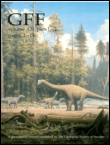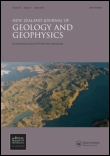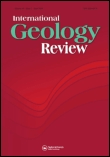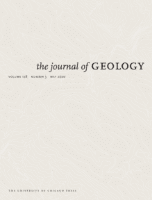
Journal of the Geological Society of Korea
Scope & Guideline
Connecting Geoscientists Across Borders
Introduction
Aims and Scopes
- Geological Mapping and Stratigraphy:
Research on the geological mapping of various regions, including detailed stratigraphic studies that provide insights into the geological history and composition of the Korean Peninsula. - Volcanology and Igneous Processes:
Investigations into volcanic activity, igneous rock formation, and related geological processes, particularly in the context of notable volcanic regions like Jeju Island. - Seismology and Tectonics:
Studies on seismic activity, tectonic movements, and the analysis of fault systems, contributing to the understanding of earthquake risks and tectonic evolution. - Environmental Geology and Hydrogeology:
Research addressing groundwater quality, hydrochemical characteristics, and the impact of geological factors on environmental and climate change. - Paleoecology and Biostratigraphy:
Exploration of past ecological conditions and the stratigraphic distribution of fossils, aiding in the understanding of historical geological and climatic changes. - Geological Hazards and Risk Assessment:
Analyses focusing on geological hazards such as landslides, earthquakes, and their implications for urban planning and disaster management.
Trending and Emerging
- Microplastics and Environmental Health:
An increasing number of studies focus on microplastics, their entry routes into ecosystems, and potential health effects, highlighting a growing concern for environmental health. - Climate Change Impact Studies:
Research addressing the implications of climate change on geological processes, water resources, and environmental sustainability is becoming more prevalent. - Advanced Geospatial and Analytical Techniques:
The use of advanced technologies such as drone-derived topographic data and machine learning for geological analysis is on the rise, showcasing innovation in research methodologies. - Geoparks and Sustainable Development:
There is a growing emphasis on the management and significance of geoparks, linking geological research with sustainable regional development and tourism. - Paleoclimate Research:
Emerging studies focusing on paleoclimate and paleoenvironmental changes are gaining importance, providing insights into historical climate variations and their geological implications.
Declining or Waning
- Traditional Mineralogy and Petrology Studies:
There has been a noticeable decline in studies focused solely on traditional mineralogy and petrology, suggesting a shift towards more applied geological research. - Geological Education and Public Awareness:
Research aimed at geological education and public outreach has diminished, indicating a potential gap in efforts to engage the public in geological sciences. - Geological History of the Korean Peninsula:
While historical geological studies remain important, their prominence has decreased in favor of more contemporary and applied research topics.
Similar Journals

GFF
Elevating Research Standards in Geology and Paleontology.GFF is a prestigious academic journal dedicated to advancing research in the fields of Geology and Paleontology. Published by Taylor & Francis Ltd in the United Kingdom, GFF serves as a vital platform for disseminating innovative findings and fostering discussions among researchers, professionals, and students alike. With a noteworthy impact factor reflecting its significance in the scientific community, GFF has achieved Q2 ranking in both Geology and Paleontology, underscoring its commitment to high-quality scholarship. The journal has been operational since 1872, accumulating a rich history of contributing to our understanding of earth sciences. It currently ranks #133 out of 321 in Earth and Planetary Sciences - Geology, and #50 out of 113 in Paleontology according to Scopus rankings. Although it does not offer an open access option, GFF remains accessible through various academic databases, ensuring that cutting-edge research reaches a wide audience. Its comprehensive scope aims to explore critical advancements in geological and paleontological sciences, making it an essential resource for those committed to exploring the intricacies of our planet’s past and present.

NEW ZEALAND JOURNAL OF GEOLOGY AND GEOPHYSICS
Advancing Knowledge in Geology and Geophysics.NEW ZEALAND JOURNAL OF GEOLOGY AND GEOPHYSICS, published by Taylor & Francis Ltd, stands as a prominent forum dedicated to the interdisciplinary exploration of geological and geophysical phenomena. With an impact factor that situates this journal in the prestigious Q1 category across key subjects—namely Earth and Planetary Sciences, Geology, and Geophysics—it is a critical resource for researchers, professionals, and students alike. The journal has been operational since 1958 and continues to contribute valuable insights into the complexities of the Earth's processes. Although it does not currently offer Open Access options, its broad readership benefits from an extensive archive of high-quality research findings that span from 1958 to 2024. Located in the United Kingdom, the journal remains a pivotal player in advancing the understanding of Earth's systems, making significant contributions to both academic inquiry and practical applications in the field.

INTERNATIONAL GEOLOGY REVIEW
Pioneering insights into the dynamic world of geology.INTERNATIONAL GEOLOGY REVIEW, published by Taylor & Francis Inc, is a premier journal dedicated to advancing the field of geology since its inception in 1959. With its Q1 ranking in the field of Geology for 2023, this journal is a significant platform for researchers, professionals, and students exploring the intricacies of Earth and planetary sciences. The journal has been rated in the 81st percentile within Scopus rankings, reflecting its influence and the high quality of articles published. Although it does not offer Open Access options, the journal maintains a rigorous peer-review process to ensure the publication of original and impactful research. With an extensive archive projected to continue until 2024, INTERNATIONAL GEOLOGY REVIEW serves as an essential resource for those seeking to deepen their understanding of geological phenomena, making it a vital contributor to the global scientific community.

ANNALES SOCIETATIS GEOLOGORUM POLONIAE
Exploring the Frontiers of Geology and Stratigraphy.ANNALES SOCIETATIS GEOLOGORUM POLONIAE is a distinguished journal published by the Polish Geological Society, focusing on pivotal research in the fields of geology, economic geology, and stratigraphy. With an ISSN of 0208-9068, this journal has established itself as an essential platform for disseminating significant findings and advancements in geological sciences since its convergence in 2008. The journal proudly holds a Q2 quartile ranking in the categories of Economic Geology, Geology, and Stratigraphy as of 2023, indicating its respectable position within the global academic community. Researchers will find its indexed status in Scopus, ranking #138/321 in Geology and showcasing a solid presence in key geological sub-disciplines. While the journal is not open access, it remains a vital resource for professionals and students striving for insight into contemporary geological research. Located in Krakow, Poland, the journal continues to contribute significantly to the understanding of geological processes and resources, making it an indispensable reference for anyone in the field.

Andean Geology
Cultivating a Community of Earth Science InnovatorsAndean Geology is a prominent open-access journal, published by the SERVICIO NACIONAL GEOLOGIA MINERVA in Chile, dedicated to advancing the fields of geology, geochemistry, petrology, paleontology, and stratigraphy. Since its inception in 2009, the journal has provided a vital platform for the dissemination of research pertaining to the Andean region and beyond, featuring high-quality articles that contribute to our understanding of earth sciences. With an impressive ranking in the Q2 and Q3 quartiles across multiple categories, it reflects a growing impact in the geological community, evidenced by its status within Scopus rankings. Andean Geology not only supports the academic pursuit of knowledge with its open-access policy but also aims to foster collaboration among researchers and professionals worldwide, ensuring wide accessibility of groundbreaking research and promoting academic engagement. By covering a diverse array of topics relevant to the dynamic field of geology, this journal serves as an essential resource for students, professionals, and scholars dedicated to earth and planetary sciences.

STRATIGRAPHY AND GEOLOGICAL CORRELATION
Pioneering Research in Earth Sciences and Stratigraphic StudiesSTRATIGRAPHY AND GEOLOGICAL CORRELATION is a prominent scholarly journal published by PLEIADES PUBLISHING INC, featuring a dedicated focus on the fields of geology, stratigraphy, and paleontology. With ISSN 0869-5938 and E-ISSN 1555-6263, this journal has been disseminating significant research findings since its inception in 1994, continuously contributing to the academic discourse through 2024. Despite not currently offering open access, its relevance is underscored by its Category Quartiles for 2023, where it has established itself as Q3 in Geology and Paleontology, and Q2 in Stratigraphy. STRATIGRAPHY AND GEOLOGICAL CORRELATION ranks #29 out of 55 in Stratigraphy and #186 out of 321 in Geology according to Scopus metrics, positioning it within the competitive landscape of Earth and Planetary Sciences. Researchers, professionals, and students are invited to engage with the journal’s content to deepen their understanding and foster innovation within these critical areas of study.

GEOLOGIA CROATICA
Elevating Geological Research for AllGEOLOGIA CROATICA is a distinguished open-access journal published by the Croatian Geological Survey, dedicated to advancing the field of Earth and planetary sciences. Since its inception in 1992, this peer-reviewed journal has become an essential resource for researchers, professionals, and students interested in various aspects of geology. With its robust impact factor and a prestigious place in Scopus rankings, ranking 127th out of 321 in Geology and 77th out of 159 in miscellaneous Earth and Planetary Sciences as of 2023, GEOLOGIA CROATICA maintains a strong international presence. It provides a platform for the dissemination of critical research findings, promoting collaboration and knowledge sharing among the global scientific community. By focusing on high-quality manuscripts that cover geological processes, hazards, and resources, this journal is pivotal for anyone looking to contribute to or expand their understanding of geological sciences. The journal's commitment to open access ensures that invaluable research is accessible to all, fostering a more informed and scientifically engaged society.

JOURNAL OF IBERIAN GEOLOGY
Pioneering research in the realm of Iberian geology.JOURNAL OF IBERIAN GEOLOGY, published by Springer International Publishing AG, is a pivotal platform dedicated to advancing the field of geology and stratigraphy. With an ISSN of 1698-6180 and E-ISSN of 1886-7995, this journal has earned its reputation in the academic community, holding a commendable Q2 ranking in both Geology and Stratigraphy for 2023, reflecting its contributions to contemporary geological research. Spanning from 2007 to 2024, it provides a comprehensive forum for scholars and practitioners from around the globe to disseminate their findings pertaining to the Iberian Peninsula, enhancing the understanding of regional geological phenomena. The journal has carved out a significant niche within the Earth and Planetary Sciences, ranking #137 out of 321 in Geology and #24 out of 55 in Stratigraphy, indicating its wide-reaching impact and scholarly engagement. The Journal of Iberian Geology serves as an indispensable resource for those interested in the complexities of geological structures, stratigraphic sequences, and the broader implications of geological research, making it a vital reference for researchers, professionals, and students alike.

REVISTA DE LA SOCIEDAD GEOLOGICA DE ESPANA
Unveiling Earth’s Secrets Through Scholarly ResearchREVISTA DE LA SOCIEDAD GEOLOGICA DE ESPANA, published by the SOCIEDAD GEOLOGICA DE ESPAÑA, FACULTAD DE CIENCIAS, serves as a pivotal platform for the dissemination of cutting-edge research in the field of geology. With its roots planted firmly in Spain, this journal focuses on advancing the understanding of geological processes and Earth sciences, making it an essential resource for researchers, professionals, and students in the discipline. Despite currently being classified in the Q4 category of Geology, the journal has the potential to evolve as it continues to publish high-quality scholarly articles, fostering dialogue and collaboration within the geological community. Although it operates without an open-access model, the journal ensures wide accessibility to its content through various academic databases. As it enters the converged publication phase from 2016 to 2024, REVISTA DE LA SOCIEDAD GEOLOGICA DE ESPANA remains committed to providing innovative insights and valuable contributions to the scientific body of knowledge in geology.

JOURNAL OF GEOLOGY
Connecting Scholars to the Heart of Earth Sciences.The JOURNAL OF GEOLOGY, published by University of Chicago Press, serves as a premier platform for disseminating groundbreaking research in the field of geology. Established in 1973, this esteemed journal has consistently ranked in the Q2 category in geology, further solidified by its Scopus ranking, where it is positioned at 99 out of 321 in Earth and Planetary Sciences, marking it in the 69th percentile of its category. With an emphasis on innovative and interdisciplinary studies, the journal features peer-reviewed articles that contribute to the understanding of geological processes, earth materials, and environmental interactions. Although it does not currently offer open access, it facilitates broad access through academic institutions to reach a global audience of researchers, professionals, and students striving to advance the knowledge of Earth's history and dynamics. As a vital resource for the geology community, the JOURNAL OF GEOLOGY plays an essential role in fostering scholarly dialogue and advancing both academic inquiry and practical applications in geology.